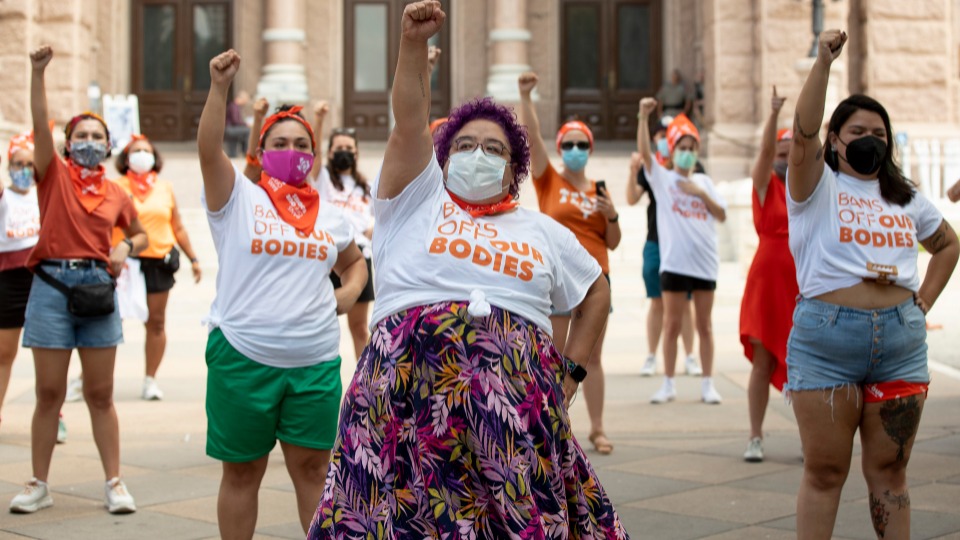
Delivering a temporary victory to fighters for women’s reproductive health, U.S. District Judge Robert Pitman ordered an immediate injunction against Texas’s latest abortion restrictions—measures which pave the way for the elimination of Roe v. Wade.
Pitman branded the Texas law, officially designated SB 8, an “offensive deprivation” of the constitutional right of women to make their own decisions when it comes to abortion. Proposed by Christian extremists at the statehouse in Austin, SB8 was signed into law by GOP Gov. Greg Abbott in May and took effect Sept. 1.
The lawsuit ruled on by Pitman was initiated by the Biden administration. Attorney General Merrick Garland has argued that the Texas restrictions defied the U.S. Constitution and called the order from Pitman “a victory for women in Texas and for the rule of law.”
SB 8 takes off from the “detectable fetal heartbeat” concept that has been employed by Republican lawmakers in several states when crafting anti-abortion measures. The Texas GOP’s law blocks women from getting an abortion once an ultrasound is able to detect cardiac activity; this typically happens around six weeks—before most women even know they are pregnant. Most medical professionals reject the supposed “heartbeat” standard because at six weeks an embryo is not yet a fetus and a heart doesn’t yet exist. In a further attack on women, the Texas law makes no exceptions for cases of rape or incest.
“From the moment SB 8 went into effect,” Pitman wrote in his 113-page decision, “women have been unlawfully prevented from exercising control over their lives in ways that are protected by the Constitution.”
He echoed what women’s health providers have been saying since before SB 8’s passage. They warned that the impact of the law would be most harshly felt among lower-income women and women of color in communities that already face major barriers in accessing health care of every kind.
Making the trip to another state requires extra money, access to a car, and long drives. It is estimated that the average round-trip driving distance for a Texas woman to an abortion clinic has increased from 24 miles to nearly 500 miles. Those unable to front the costs or find a way to get to a neighboring state have been completely denied their right to reproductive choice.
Melany Linton, president of the Gulf Coast branch of Planned Parenthood, told the press in mid-September that since SB 8 took effect, “exactly what we feared would happen has come to pass.” The number of patients seeking services at Texas Planned Parenthood clinics has plummeted by 80%, and Lynton referred to women traveling as far as 1,000 miles and spending hours on the road trying to access reproductive health services after the law shuttered most abortion clinics in Texas.
The nonprofit Fund Texas Choice, which offers financial support for women unable to afford the travel costs to access abortions, fears it will soon run out of money—for two different reasons. First, the average amount requested by clients is higher. But second, donations are drying up because supporters fear getting sued if they give money.
That’s because the Texas law features a cruelly innovative enforcement mechanism. It makes private citizens, rather than the state government, responsible for taking legal action to stop abortions—so as to avoid the jurisdiction of federal courts. The gate is thrown open for individuals to file lawsuits against any person they deem to be participating in providing or helping a person access an abortion.
It exposes not just doctors but also health information providers and advisors, family members of women, friends who drive a woman to a clinic—essentially anyone connected to facilitating a woman’s right to make decisions about her reproductive health, including groups like Fund Texas Choice—to legal liability. Any anti-woman vigilante who succeeds in their lawsuit will be rewarded with a cash prize of $10,000, to be paid from taxpayer money.
Pitman dragged Republican lawmakers in Texas over the coals for contriving such “an unprecedented and transparent statutory scheme.”

His ruling is the first win for women since the Supreme Court last month allowed SB 8 to stand by a 5-4 decision. With a right-wing majority buffeted by three Trump-named extremists, the ruling justices claimed their decision was based on the failure of abortion providers—the appellants in the case—to meet the burden of proof that a block on the Texas law was merited.
Their unsigned order left open the likelihood that the issue would be revisited, however, as they said it was “not based on any conclusion about the constitutionality of Texas’s law.”
Pitman, who was appointed by former President Barack Obama, said that while “other courts may find a way to avoid this conclusion is theirs to decide,” he would not “sanction one more day of this offensive deprivation of such an important right.”
Republican officials in Texas immediately announced they would try to reverse Pitman’s decision with an appeal to the 5th U.S. Circuit Court, which has been far friendlier to repressive anti-abortion laws. The likelihood of a state victory there means abortion providers in Texas are still hesitant to resume services out of fear they will be subject to more vigilante lawsuits once SB 8 is back in effect.
Eventually, SB 8 is likely to return to the Supreme Court for a final determination of its constitutionality. The court is already scheduled to hear another abortion case in December when Mississippi will ask it to overturn Roe v. Wade. Planned Parenthood estimates that if that landmark 1973 ruling is invalidated, as many as 26 states will immediately and completely ban abortions.
Almost 600 different abortion restrictions have been introduced by Republicans in statehouses across the country in 2021 alone; 90 have already become law. The attacks on women’s health are one component of the GOP’s effort to energize its voter base ahead of the 2022 and 2024 elections. Fresh restrictions on voting rights are another aspect of GOP strategy.












Comments